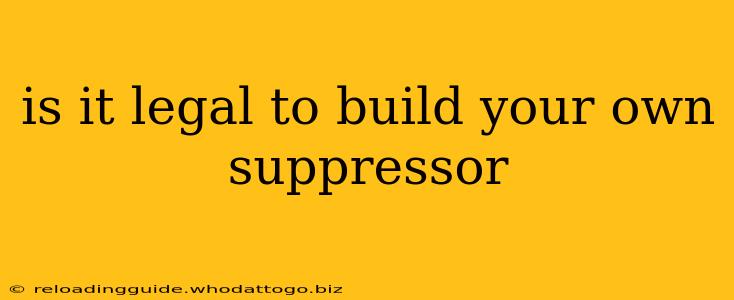Building your own suppressor might seem appealing, offering potential cost savings and customization. However, the legality surrounding homemade suppressors is complex and varies significantly depending on your location. This guide explores the legal landscape, emphasizing the severe penalties for non-compliance. It is crucial to understand that building a suppressor without proper authorization is almost certainly illegal in most jurisdictions.
The Legal Minefield of Homemade Suppressors
The legality of manufacturing a firearm silencer (suppressor) is governed primarily by the National Firearms Act (NFA) of 1934 in the United States. This act strictly regulates the production, transfer, and possession of various items, including suppressors, machine guns, and short-barreled rifles/shotguns. Under the NFA, building your own suppressor is considered manufacturing a regulated firearm, requiring a significant amount of paperwork, background checks, and associated fees.
Key Legal Considerations:
- Registration: Any suppressor, regardless of its origin (homemade or commercially produced), must be registered with the Bureau of Alcohol, Tobacco, Firearms and Explosives (ATF). Failing to register a homemade suppressor carries severe penalties.
- Tax Stamp: A substantial tax stamp is levied on the manufacture of NFA items, including suppressors. This tax must be paid and the application approved before legal manufacturing can begin.
- Background Check: A thorough background check is conducted before approval for manufacturing is granted. Individuals with a criminal history or other disqualifying factors will be denied.
- Serial Numbering: Each legally manufactured suppressor must bear a unique serial number, registered with the ATF.
State Laws and Local Ordinances
While federal law sets a baseline, individual states may have additional restrictions or stricter regulations regarding the manufacturing and possession of suppressors. Some states may completely prohibit the possession of suppressors, regardless of federal registration. It's imperative to research your state's specific laws before even considering building a suppressor. Further, local ordinances could impose additional regulations.
Penalties for Illegal Suppressor Manufacturing
The consequences of building a suppressor without the proper authorization are severe and can include:
- Significant Fines: Financial penalties can reach tens of thousands of dollars.
- Imprisonment: Jail time is a very real possibility, with sentences ranging from years to decades depending on the circumstances.
- Forfeiture of Property: The suppressor, along with other firearms or property, may be confiscated.
- Felony Charges: Manufacturing a suppressor illegally is typically a felony offense, carrying significant long-term repercussions.
Safer Alternatives: Purchasing a Legally Manufactured Suppressor
Instead of risking the substantial legal ramifications of building your own suppressor, consider purchasing a commercially manufactured suppressor from a licensed dealer. This process, while involving paperwork and background checks, is far less risky and ensures compliance with all applicable laws. This option grants legal ownership and removes the potential for severe legal consequences.
Disclaimer:
This information is for educational purposes only and should not be construed as legal advice. Always consult with a legal professional specializing in firearms law to ensure compliance with all applicable federal, state, and local regulations before undertaking any actions related to firearms or suppressors. Ignorance of the law is not a defense. The penalties for violating the NFA are severe.

